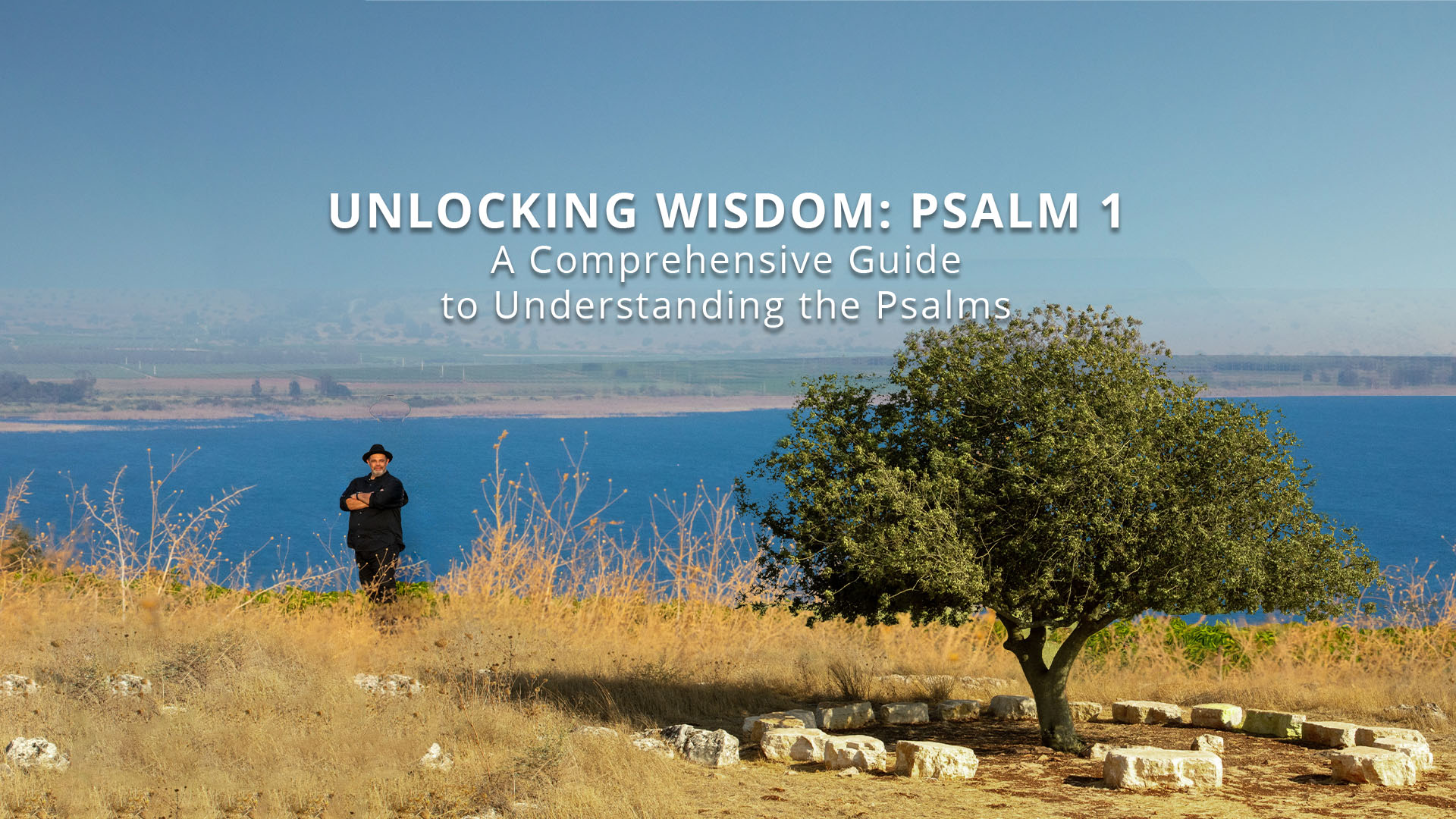At 150 chapters, the Book of Psalms is the longest in the entire Bible. By far. With so many pages of God’s Word dedicated to these ancient Hebrew prayers, it’s probably worth asking: what is the point of the Psalms? How should we read the Psalms? While it’s true that the Book of Psalms is a collection of songs and prayers that facilitate our communion with God, there’s so much more going on in these beautiful (and often vulnerable) passages of Scripture. There is probably no better way to start a study of the Psalms than by going to the beginning. Psalm 1 is a revelation of wisdom and godly insight that helps us make sense of all the Psalms following it.
Unlocking Wisdom and Godly Insight with Psalm 1: A Comprehensive Guide to Understanding the Psalms


What is the point of the Psalms? How should we read the Psalms?
Dr. J. Clinton McCann, in his book A Theological Introduction to the Psalms: Psalms as Torah, makes a compelling argument that the book of Psalms is the fifth book of wisdom literature in the Bible (the others being Proverbs, Job, Song of Songs, and Ecclesiastes). In his paradigm, each book is meant to teach us something about living the spiritual life.
- Job shows us that even the righteous can suffer calamity.
- Proverbs teaches us to pursue wisdom and describes its rewards.
- Song of Songs teaches us about love, both human and divine.
- Ecclesiastes encourages us to live for God in the moment and not become overly attached to this world.
This leaves us with the Book of Psalms…
Psalms, in particular, offers us instruction and wisdom for worshiping God in various ways, through all of life’s triumphs and defeats. It is impossible to read Psalm 88 and not glimpse the miserable depths of life’s darkest moments. Likewise one cannot read Psalm 100 and not bask in the joyful glow of life’s triumphs. The Book of Psalms also teaches us to live a life that worships God through our actions. Their regular usage through liturgy ingrains these messages in our souls, as the mind tends to believe that which it hears repeatedly.
For starters, one must consider that Psalms, a divinely inspired book of prayers and songs used in the Temple, was deliberately composed. With this truth in mind, we approach Psalm 1. The “editors” of the Book of Psalms specifically chose this “song” to introduce the whole work. Just as the Creation account in Genesis 1 sets the stage for everything to follow in the Torah (including the Exodus), Psalm 1 strategically sets the stage for the following 149 Psalms.
Psalm 1 ~ Torah is a Tree of Wisdom
Verse 1:
Happy is the one who has not walked in the advice of the wicked,
nor stood in the way of sinners,
nor sat in the seat of scoffers.
Whenever I read the walk-stand-sit progression in this verse, I think of an old saying regarding rest, one that even makes an appearance in the U.S. military’s SERE (“Survival Evasion Resistance Escape”) manual: “If you are standing around with nothing to do, lean against something. Then since you are already leaning, have a seat. Now that you are close to the ground just lay down. Since you are already laying down, take a nap.” In general, these “instructions” serve as a means of energy conservation and panic prevention, as each step can put you more at ease in your surroundings. While the inverse of the happy man in our verse does not take a nap, we do see this continually intensifying trajectory toward being settled and established.
The Malbim writes that there is also an intensification of the characters in Psalm 1.
“Wicked” are those who know what they are doing is wrong but fail at resisting their various desires and temptations. Whereas “sinners” are those who willfully do what they know is wrong, without being overcome by their desires. Finally the “scoffers” are those who simply reject the authority of God and ridicule those who accept it. Again sinking deeper into reprobation.
Verse 2:
But his delight is in the Torah of Adonai,
and on His Torah he meditates day and night.
The composer of Psalm 1 utilized a “chiasm”—a literary structure that makes comparisons using inverted parallel ideas. The second verse is the center of these parallels, comparing the wicked and the righteous. This chapter’s emphasis on “law” has proven problematic for many biblical scholars and non-specialists alike. One interpreter captures the nature of this problem effectively: “It’s not difficult to see why someone might find Psalm 1 a quite insufferable Psalm about a quite insufferable fellow. There he sits, day and night, brooding and fretting over the law. What a pedant!” For Christian readers of Psalm 1, “the righteous” may sound even worse than pedants (people obessed with minor details and rules or with displaying academic learning.). Christian readers may be inclined to read Psalm 1 in the light of New Testament statements such as…
“We consider a person to be set right apart from Torah observance.”
OR
“Yet we know that a person is set right not by deeds based on Torah, but rather through putting trust in Messiah Yeshua. So even we have put our trust in Messiah Yeshua, in order that we might be set right based on trust in Messiah and not by deeds based on Torah—because no human will be justified by deeds based on Torah.”
However, interpreting Psalm 1:1-2 this way is to misunderstand it horribly. Such a reading would also be little more than a reductionistic spin on the New Testament. You may recall that Paul also insisted: “Do we then nullify the Torah through faithfulness? May it never be! On the contrary, we uphold the Torah” (Romans 3:31). Most significantly, Yeshua announced, “Do not think that I came to abolish the Torah or the Prophets! I did not come to abolish, but to fulfill” (Matthew 5:17). This interpretive problem stems from translating the Hebrew word Torah—which essentially means “instruction”—as “law.” Understood through an accurate lens, Psalm 1 reads very differently. Instead of praising legalism, it is an invitation to partake in God’s perfect instruction, including instruction on how to live the life of worship revealed in the following 149 Psalms.
Verse 3:
He will be like a planted tree over streams of water,
producing its fruit during its season.
Its leaf never droops—
but in all he does, he succeeds.
Again the Psalm leans heavily into the Wisdom Tradition of the Hebrew Bible. This one verse arguably encapsulates the entire message of the Book of Proverbs. The wise who embrace instruction and seek wisdom succeed. Job and Ecclesiastes will then better define what that “success” means.
Verses 4-6:
The wicked are not so.
For they are like chaff that the wind blows away.
Therefore the wicked will not stand during the judgment,
nor sinners in the congregation of the righteous.
For Adonai knows the way of the righteous,
but the way of the wicked leads to ruin.
In these last three verses the contrasts of the wicked come fast and hard. The psalmist wants to clearly distinguish between those who embrace God’s instruction and those who choose to walk a different path. The second choice is obviously unadvisable. The invitation to embrace God’s instruction stands open to all. Accordingly, everyone will end up exactly where their choices led them. Rejection of God’s gracious invitation is not without consequence, of course.
Thus in keeping with the informed consent, which is essential to a free will choice, the psalmist lays out the alternatives. Yeshua did, in a certain sense, echo this invitation when He encouraged people to consider the cost of being a disciple before agreeing to follow Him (cf. Luke 14:25-31). Psalm 1 essentially throws up a classic fork-in-road sign.
One could choose to reject God’s instruction and continue in the way of the world, or one can choose to accept God’s instruction and proceed into the life of faithful worship and prayer revealed in the following 149 Psalms.
Unless otherwise noted, all biblical passages referenced are in the Tree of Life Version.
J. Clinton McCann, A Theological Introduction to the Book of Psalms: The Psalms as Torah (Abingdon Press 1993), 9.
See Rashi on Genesis 1:1 for a fuller explanation.
FM 64-4, Department of Defense 1985 p42
a 19th century Russian rabbi, master of Hebrew grammar, and Bible commentator.
Ad loc
A literary structure where parallel elements correspond in an inverted order (i.e., A-B-C-Cʹ-Bʹ-Aʹ).
G. Theodoor Rothuizen, Landscape: A Bundle of Thoughts About the Psalms (the First Fifty) (Richmond: John Knox Press, 1971), 12.
FREE WEEKLY TORAH PORTIONS:
"Love, love, love it! Really enjoying them learning a lot!"
What is Fusion with Rabbi Jason?
It is in looking back at what God has done that we can see forward to His future plans for us. “For I know the plans I have for you,’ declares the Lord, plans to prosper you and not to harm you, plans to give you hope and a future” Jer 29:11.
At Fusion Global with Rabbi Jason Sobel, we want to add definition to your faith as we restore the lost connection to our ancient roots and rediscover our forgotten inheritance.
Cart
Psalm 1
1 Happy is the one who has not walked in the advice of the wicked,
nor stood in the way of sinners,
nor sat in the seat of scoffers.
2 But his delight is in the Torah of Adonai,
and on His Torah he meditates day and night.
3 He will be like a planted tree over streams of water,
producing its fruit during its season.
Its leaf never droops—
but in all he does, he succeeds.
4 The wicked are not so.
For they are like chaff that the wind blows away.
5 Therefore the wicked will not stand during the judgment,
nor sinners in the congregation of the righteous.
6 For Adonai knows the way of the righteous,
but the way of the wicked leads to ruin.



